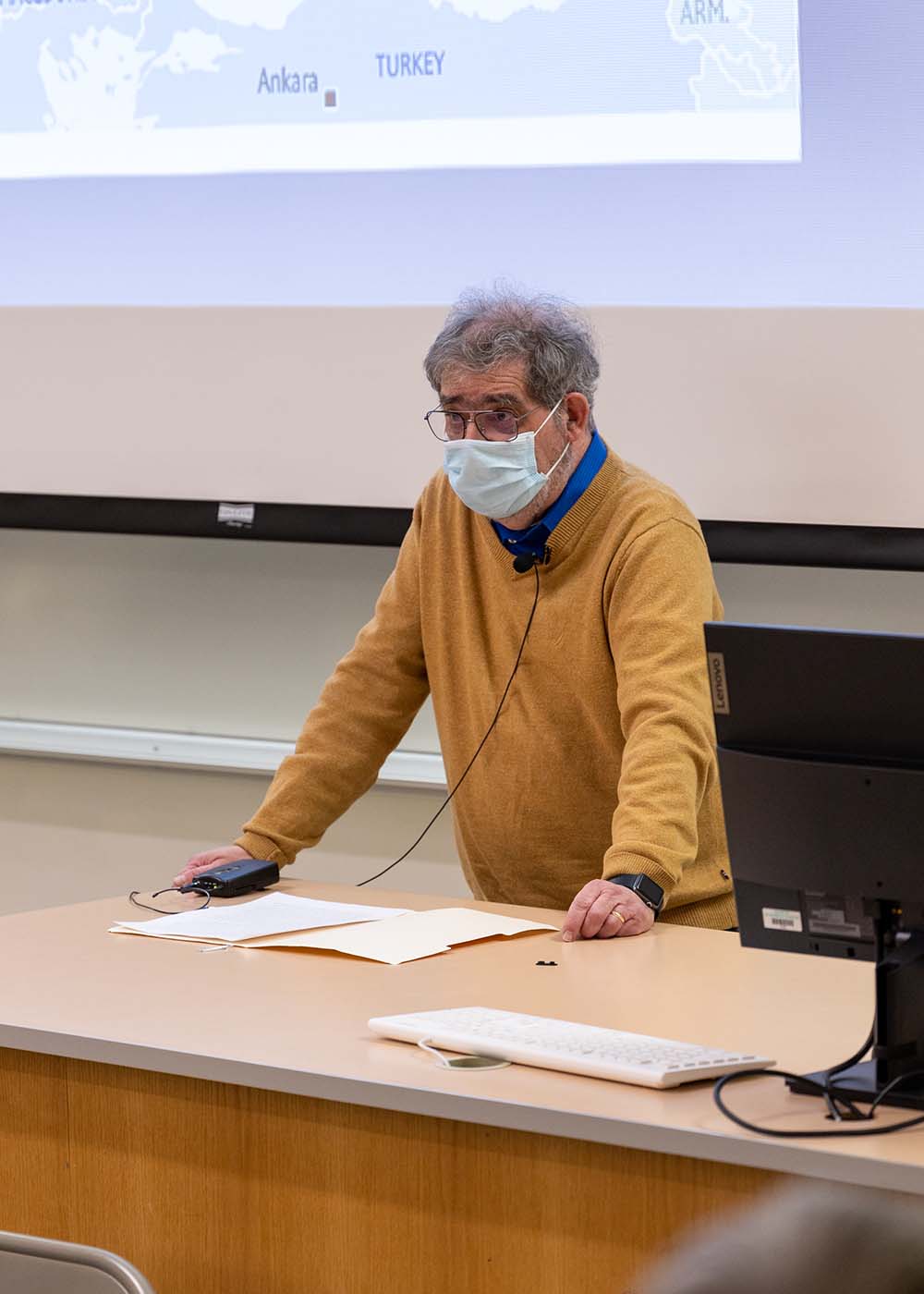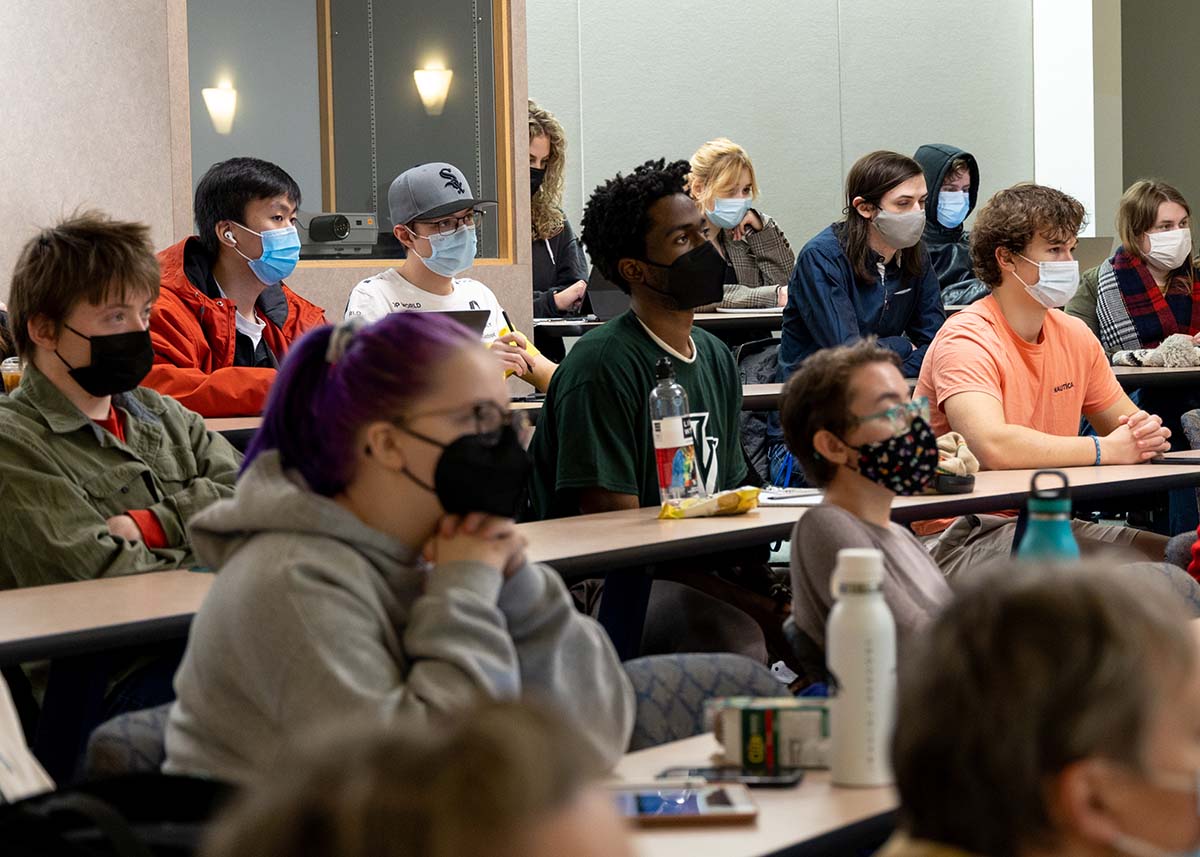Faculty Weigh in on Ukraine Conflict, Discuss Outcome with Students
March 10, 2022
BLOOMINGTON, Ill. – As the Russian invasion of Ukraine enters its third week, Illinois Wesleyan University professors joined a panel discussion to share insight and address implications of the conflict.

The March 8 panel was organized by students in the Political Science Honor Society (Pi Sigma Alpha) and the International Studies Honor Society (Phi Beta Delta). Panelists included Professor of History Thomas Lutze, Professor of History April Schultz, Emeritus Professor Irv Epstein and Adjunct Assistant Professor of Political Science Julian Westerhout.
The conversation began with a nod to International Women’s Day, recognizing the strength of Ukranian women who have picked up arms to fight or have been forced to flee the country alone with their children. Panelists went on to address humanitarian concerns, civilian resistance in Russia and global impacts of the war before opening the room for discussion with attendees.
Westerhout announced that several Russian scholars who previously visited Illinois Wesleyan have been arrested for protesting the war and Vladimir Putin’s regime in the last week. He shared remarks on behalf of retired IWU Professor of Russian Studies Marina Balina, who left the former Soviet Union in 1988, regarding the current protests in Russia.
“As in Soviet times, military departments are being created at universities. Every student, whether studying physics or history of literature, becomes a potential soldier and can be drafted into the army. But people resist. Especially young people,” Westerhout read from Balina’s correspondence.
Lutze explained the history of NATO, including Ukraine’s interest in joining, and the significance of NATO’s collective defense principle – or Article 5.

“Article 5 says any attack on a NATO member is an attack on all, so it brings the response of all members to opposition. From Russia’s perspective, this is a potential threat because most of these recent (NATO) members are those who formerly were in the Soviet sphere,” he said.
If Putin had hoped to boost national security for Russia and weaken NATO through this war, Lutze said the opposite has happened.
“NATO has not always been unified. What we have seen in the last two weeks is that NATO has massively unified,” he said. “On top of that, Switzerland, who has famously been neutral in wars has, for the first time in modern history, abandoned that neutrality and joined in the sanctions against Russia.”
Epstein spoke on the war’s violation of human rights and how it will affect the global refugee crisis. He noted that one out of every 95 people on Earth has fled their home due to conflict or persecution. More than 2 million refugees have fled Ukraine in the last 10 days.
“Before the Ukraine crisis, 68% of all refugees came from five countries – Syria, Venezuela, Afghanistan, South Sudan and Myanmar. The number of Ukrainian refugees in a little over a week has already exceeded the number of refugees from Myanmar and is quickly approaching that of South Sudan,” said Epstein. “Noting that the world has previously not been particularly accomodating to non-European refugees, it is clear that in coming years the world refugee crisis will be expanding dramatically.”
Schultz outlined the friendship between Russia and China and how it could impact the war. He also explained the possibility that a similar conflict could unfold between China and Taiwan if Taiwan were to formally declare independence.
As the panel ended with an open discussion, students asked about additional global impacts of the conflict and speculations on the outcome.
“The fact that the Ukranian people are now talking about ‘people’s war’ gives me hope that, even if it’s a long-term struggle, that a people’s war can overcome and be victorious,” said Lutze.
By Julia Perez